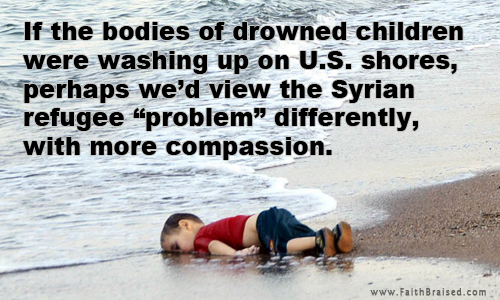When I was a kid, it wasn’t unusual when someone acted badly in a classroom or any group situation, that everyone got punished for it.
This would happen because the adult-in-charge either couldn’t identify a specific bad actor, or was just too exasperated and took the easy way when it came to “discipline.”
Whenever this happened, I seethed inside my little innocent child’s heart.
 Often the punishment would be a withholding of something we all coveted: craft time, story time, an extra five minutes on the playground, a snack, and so on.
Often the punishment would be a withholding of something we all coveted: craft time, story time, an extra five minutes on the playground, a snack, and so on.
Even more infuriating would be the times when the group identified the do-badder(s) and the teacher or other figurehead of authority would still impose blanket injustice, I mean, discipline.
What?!
Boy, did that ever teach us a lesson, youbetcha.
Right.
Lessons learned from bad adult behavior
What it taught me is that it’s important to ensure justice to those denied it. To work hard at getting to the facts. To act on the truth and in fairness. To practice the Golden Rule by doing unto others as we would have them do unto us.
Okay, so these lessons crystallized a little later in my adult life.
While still young, I quite honestly held a strong childlike hatred in my heart toward those who lazily, unfairly imposed generalized punishment.
This did not endear me to those people. Frankly, there’s one who, whenever this teacher comes to mind, I still have to work at forgiving.
Even as an child, I understood that a great way to earn anger and hostility from any group is to treat them as a mass impersonal blob, assume they’re all bad actors, and enmesh them in generalized punishment or restriction.
In other words, treat them all like naughty children.
This really works well on adults.
Sort of like what’s happening with all the recent calls to block the movement of Syrian refugees beyond wherever they are now.
Everyone freeze!
Definitely don’t let them into the land of the free and home of the brave where we live! Any one of them could be a terrorist!
Gah!
Sorry, I’m just not buying it.
Zero tolerance is intolerance
In my post yesterday I argued, among other things, against blocking our borders -- states or country -- to Syrian refugees.
Despite the best efforts of some who disagree, I’ve not met an argument yet that would move me one iota away from my previously stated position.
I don’t believe the blanket closing of borders to Syrian refugees wanting to legally enter our country, or any country, is a biblically legitimate Christian response.*
This doesn’t mean we let them in without some degree of vetting, just as we do with anyone wanting to come in legally.
But it does mean we will be taking some risks.
But so what? Hasn’t that always been the case?
Haven’t there always been those wanting to get into our country to do bad things?
I believe the primary difference today compared to the past is that those wanting to do us harm, instead of coming in quietly and covertly, are announcing their intentions, often and loudly. But this doesn’t automatically mean we are more at risk or that they will be successful.
As much as I abhorred as a kid the “punishing all for one” discipline approach, today I loathe nearly every expression of “zero tolerance” policies I’ve encountered.
Falling back on “zero tolerance” is the lazy, mindless, knee-jerk way to deal with any situation and avoid having to think too hard about anything.
You know, “No guns! Even if it is a half-chewed Pop-Tart. Case closed. Done. Shut up. Go away.”
Yet this is the approach many are espousing toward the Syrian refugee situation.
What’s really going on here
And, let’s be brutally honest, there are really only two motivations behind these “closed borders” calls:
- Irrational fear. With a dash of bigotry. Many, falsely, believe that we are living under an unprecedented threat and letting any Syrian refugees in -- even 5-year-old orphans -- will make life dangerous for us. I guess they have veins full of C-4 or something. In other words, we want to deny safety to those who are fleeing very real and present dangers to protect ourselves against the imagined potential of some unspecified harm that may or may not happen. That’s pretty selfish, paranoid, and not at all how Christ would expect Christians to behave, or think.
- Politics. Every Governor, Presidential candidate, or other elected official calling for closed borders is merely playing self-serving politics with the lives of the Syrian refugees. They are dehumanizing real people as pawns for political gain. Period.
By the way, these kinds of reactions have occurred before such as around the time of WWII.
Some, especially among my Christian friends, try to mitigate the harshness of what is nothing less than bigotry toward the Syrian refugees, by suggesting we do more to create “settlements” closer to their homes. Sounds nice, right?
This is more or less the argument that can be discerned in a recent blog post by Reformed Evangelical Kevin DeYoung that many are citing and sharing. I like Kevin, but here he’s off the mark.
In other words, this message goes, (a) let’s keep them in the region of the world they are fleeing (because of imminent devastation, very real risk of death and dismemberment, starvation, rape, and worse that awaits them there), and (b) let’s send help to them but not let them “in our back yards.”
You know, let’s keep the problem “over there” where we can’t see it. Or be truly touched by it.
Out of sight, outside our borders, out of mind.
The image that is conjured listening to certain wild-eyed arguments is of an ammo-belted, machine-gun armed Jesus standing at our border proclaiming, “Keep out, you heathen!”
Not a good Christian witness. And not what Jesus would do.
A sure way to radicalize those who aren’t already
I can’t think of a better way to radicalize an entire group of people than by dehumanizing them into political pawns, pushing them away, corralling them into settlements, forcing them to stay in danger, refusing to help them, and denying them entry into a country where they can be safe and warm.
And I can’t think of a better way to enrage their countrymen already living among us than by mistreating and denying justice and aid to their husbands, wives, fathers, mothers, brothers, sisters, uncles, aunts, cousins, nephews, friends, and former neighbors who are “over there” in need.
In other words, if you think we’ve got a problem now protecting against a potential handful of bad actors, just wait.
Keep thinking “closed borders” and “containment” and it’s going to get a lot worse.
A marginalized people is not a happy people.
Doing the right think is almost always risky
Yes, open borders bring risk. But that’s always been the case. Always.
Even Jesus risked accepting a traitor into the ranks of his disciples.
Yes, Judas betrayed Christ, but Judas also paid a heavy price. And as for the cause of Christ? It has flourished despite facing many risks since. And there are a lot more to come.
The potential for risk does not relieve us from our duty to care for refugees in need.
Jesus declared, “This is my commandment, that you love one another as I have loved you. Greater love has no one than this, that someone lay down his life for his friends. You are my friends if you do what I command you” (John 15:12-14, ESV).
The Apostle John explained, “By this we know love, that he laid down his life for us, and we ought to lay down our lives for the brothers. But if anyone has the world's goods and sees his brother in need, yet closes his heart against him, how does God's love abide in him?” (1 John 3:16-17, ESV).
To paraphrase, if we have the means to provide a safe warm place for our Syrian brothers and sisters in need, yet close our borders against them, how does God’s love abide in us?
Seriously, how?
=======
Additional reading:
- Don't 'scapegoat' Syrian refugees, Catholic bishops and evangelicals say
- Christians Debate State Bans on Syrian Refugees after Paris Attacks
- What Americans thought of Jewish refugees on the eve of World War II
- Six reasons to welcome Syrian refugees after Paris
- Can Terrorists Really Infiltrate the Syrian Refugee Program?
(*NOTE: I believe France closed their borders not so much to keep people out but more to prevent those involved in the Paris attacks from fleeing justice. But I could be wrong.)
=======
 Do you agree with closing the borders of states and refusing entry to refugees into the U.S.? Why or why not? Please share your thoughts -- civilly -- in the comments!
Do you agree with closing the borders of states and refusing entry to refugees into the U.S.? Why or why not? Please share your thoughts -- civilly -- in the comments!
BTW: I’m an Evangelical Christian and usually Republican-voting conservative, so I know my opinions are messing with your broad-brush assumptions about people like me and that just makes me smile.
Lest we forget:
 |
| A young Syrian boy lies in the surf near Bodrum, Turkey (Reuters) |
And one last thought: The only thing worse than blocking access to all Syrian refugees is advocating for allowing only Christian refugees in. The only right decision is to mercifully extend a warm welcome to all. Period.
Comments